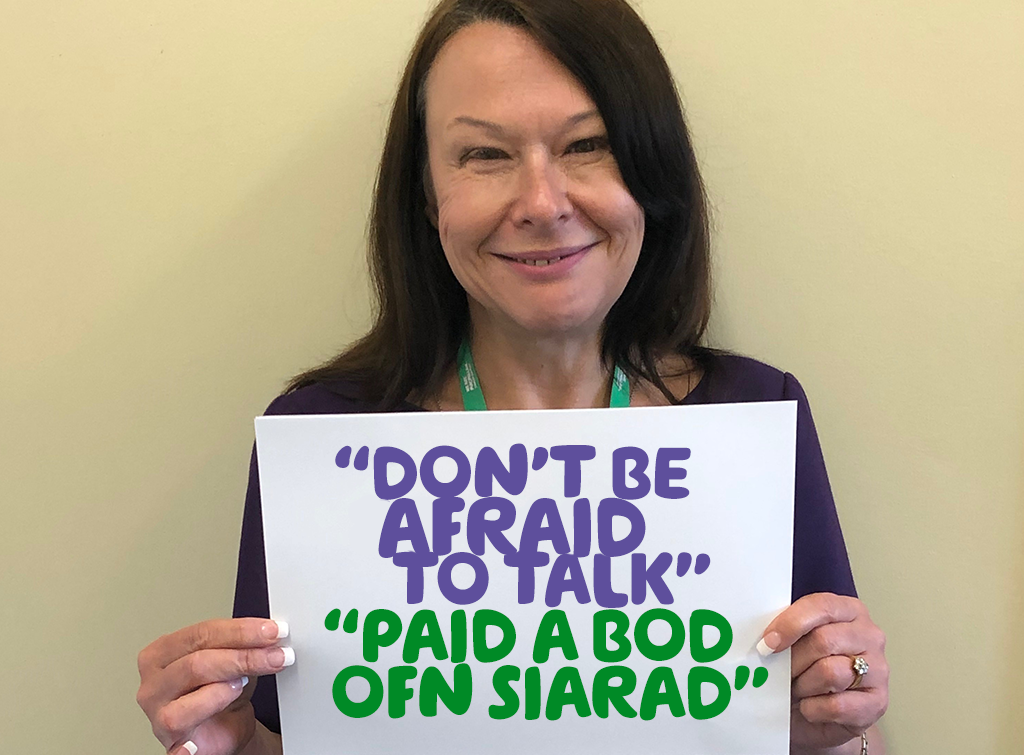“Cancer can take a lot away. It shouldn’t take your relationships as well.”

Cancer can throw people’s lives upside down. Often the greatest impact is not the treatment or the illness itself, but the life-changing side effects it can leave behind.
In our latest blog series, we tackle the ‘taboo’ subjects that every year leave thousands of people with cancer either too worried, or too embarrassed, to ask for the help they need.
A recent Macmillan poll suggests that sex and relationships are the number one taboo issue in Wales, with over half of people saying they would find it difficult to talk about.
Julie Armytage is a Macmillan Counsellor. In the first of our cancer ‘taboo’ blogs, she explains why concerns over sex and intimacy should never be left unspoken.
Julie: I’ve been a Macmillan Counsellor now for over 4 years. My job is to support people with the psychological and emotional impacts that cancer can have on their lives.
While the impacts of cancer are wide ranging, I know from experience just how unspoken and therefore unheard and unresolved, so many of these impacts can be.
As this recent Macmillan poll suggests, we know that sex and intimacy can feel like an uncomfortable or embarrassing subject for people to talk about.
Many people struggle to know who to turn to, and often find it difficult to open up to their loved ones in a frank and honest way.
No one should have to face this sense of loneliness or isolation without support.
Sex and intimacy are natural human emotions and functions. They are an essential part of our lives.
Feeling unable to talk about intimacy following a cancer diagnosis and treatment runs the risk of creating so many further problems.
From the earliest stages of diagnosis, right the way through treatment and recovery, people with cancer are often at their most vulnerable.
It is a situation in which the one thing that so many people with cancer are too embarrassed to talk about, is often the one thing they probably need more than ever.
They are right at the centre of an often-terrifying situation – a situation in which a sense of intimacy, a sense of comfort and confidence in their relationships, can do so much to help them through.
While sex and intimacy are not always talked about publicly – certainly not to the honest and open extent they should be – we do know it is often one of the most common issues created by cancer.
Whether it is through physical side-effects like impotence or incontinence, or through psychological issues like body image or depression, research suggests that around 43% of cancer patients believe their sex life has suffered because of their illness.
Feeling too embarrassed to talk about it can have a profound effect on people’s mental health, well-being and their ability to cope with their wider cancer experience.
That is why it is so important for people to speak out.
Cancer can not only have a negative impact on how you feel about sex and intimacy, and it can do so at a time when it is so important to be able to express love, closeness and feel comfort.
Help is available. Help which will make it easier for people to adjust to the difficulties that cancer has left them with, and to deal with issues around body image, fatigue, a loss of desire or pain.
By talking about issues like sex and intimacy, people can work out how best to overcome the impact that cancer has had within their relationships.
It can help deal with issues like anger, anxiety and depression, as well as issues like guilt or grief. In doing so it can help people shape their expectations around resuming or maintaining their sex life and rediscover that vital sense of intimacy and confidence with their loved ones.
The reality is that cancer can take a lot away from people. It shouldn’t take their relationships as well.
Talking about sex and intimacy may not be easy, but it can do so much to help someone with their mental health, their emotional wellbeing and their self-esteem. In doing so it can aid their wider recovery.
For information, support or just someone to talk to, call 0808 808 00 00 or visit macmillan.org.uk